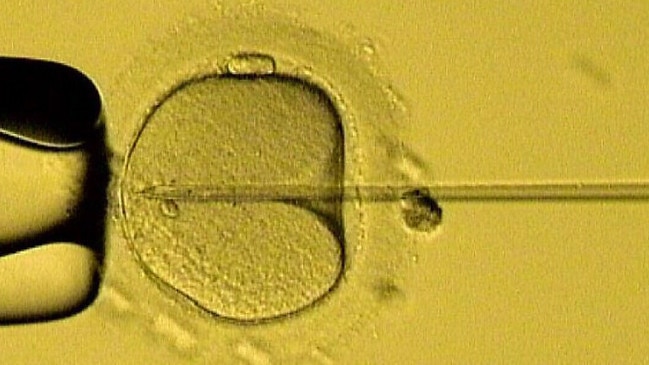
Sexual reproduction was a huge development in the evolution of life. Prior to this innovation, simple organisms could only reproduce by cloning themselves.
Although cloning is simple and efficient, genetic mutations are passed on to offspring. Sexual reproduction, however, enables organisms to discard unwanted mutations. And it caught on because genetic diversity allows organisms to adapt more quickly to the environments around them, ensuring their survival.
Many forms of complex life, including algae, some species of fish, reptiles and plants, continue to reproduce asexually (ie, from one parent). But our species does not. Like those ancient eukaryotes, we reproduce by combining our DNA with other members of our species.
One half of our species produces large gametes, which are eggs, and the other half produces small gametes, which are sperm. We call the egg producers “female” and the sperm producers “male”.
Although a very small number of humans have both male and female genitalia due to disorders of sexual development, there is no third-party intermediate sex involved in sexual reproduction. There is just a male and a female.
It is hard to conceptualise how long two billion years is – that is, how fundamental sexual reproduction is to life on Earth. Imagine two billion years compressed into a metaphorical century. The advent of sexual reproduction would appear at the year zero, while homo sapiens would only emerge in the 99th year around the 25th of December. The Enlightenment and the era of scientific discovery would occur in the final seconds of the century.
In these last moments, humans developed a new range of tools that helped them to understand the world around them through testing and observation. Thanks to these new tools, we now understand the laws of motion, the Theory of Relativity and the structure of DNA.
What defined the Enlightenment, and the scientific discoveries that followed, was an acceptance that the world needed to be understood as it is, rather than as we want it to be.
In 2013, Australia’s Sex Discrimination Act (1984) was amended, shifting the definition of “woman” from “an adult human female” to “anyone who identifies as a woman”.
This year, the acting Sex Discrimination Commissioner even advised the Federal Court that trans women should be entitled to protections related to pregnancy and breastfeeding.
The Commissioner contends that the concept of “sex” is not tied to biology but is fluid. The advice to the Federal Court elaborated, stating that “sex” encompasses being male, female, or a non-binary status and that a person’s “sex” can change.
Of course, words can and do change over time. Language evolves and the customary uses of words are not fixed in place and time. Nevertheless, the word “sex” is a term of biological classification. It refers to reproductive anatomy and function across all biological taxonomy – not just humans.
Second-wave feminists originally drew a clear line between “sex” as a biological category and “gender” as a socially constructed one, in order to challenge traditional roles and expectations for women.

In recent times, however, “sex” has collapsed into gender as a fluid or socially constructed category, erasing the distinction altogether.
But if “sex” is now redefined as fluid and socially constructed, then we will need new words to articulate biological reality, such as the ability to produce eggs or sperm, and the ability to gestate a foetus and nurse offspring.
This reality is not trivial, and we need words to describe it. Sexual reproduction has a profound effect on who we are as a species – and it is those of us who produce eggs that carry the heaviest burden because of it.
The Sex Discrimination Commissioner has not yet to provided new terminology to capture this reality – despite “sex discrimination” being her primary focus. To date, the distinction between gender and sex has been a parsimonious one. But it appears it has been discarded in order to prevent offending those who believe they can change sex by virtue of wishful thinking.
While accommodation and flexibility in government regulation is a good thing, it should not necessitate the wholesale redefinition of commonly used terms.
As philosopher Holly Lawford-Smith has written: “Trans people should be protected from discrimination targeting their being trans, but they should not be protected as the opposite biological sex simply in virtue of identifying as the opposite sex.”
The charitable interpretation of the arguments made by the Sex Discrimination Commissioner is that they attempt to keep the Australian Human Rights Commission up to date with current trends.
As the community moves towards a belief that “sex is fluid”, arguably the law should reflect these developments so as not to be out of step with contemporary mores.
But just because these notions are fashionable does not make them true. And even if we accept that gender is fluid, that does not mean sex is. A person cannot produce sperm one day and then eggs the next.
In the past, it was widely believed the sun orbited the Earth, witches lived among us, and that the Earth was flat. Contemporary popular but false beliefs include the notion that vaccines cause autism, that humans and dinosaurs coexisted, and that the moon landing was a hoax. Scientologists hold the belief that we each have a “thetan” that reincarnates in various bodies over multiple lifetimes.
The popularity of a belief does not validate its truthfulness.
What validates a belief’s truthfulness are the tools we have developed in those last fractions of a second in our two-billion-year timeline: the tools of empirical testing and observation integral to science.
And as the great evolutionary biologist, Richard Dawkins, reminded us recently: “There are two sexes in mammals, and that’s that.”
Claire Lehmann is founding editor of online magazine Quillette.



Some two billion years ago, our ancestors, microscopic eukaryotes, started having sex. Instead of one parent cloning itself to produce genetically identical offspring, a process developed allowing two parents to combine genetic material to create genetically distinct offspring. We call this sexual reproduction.